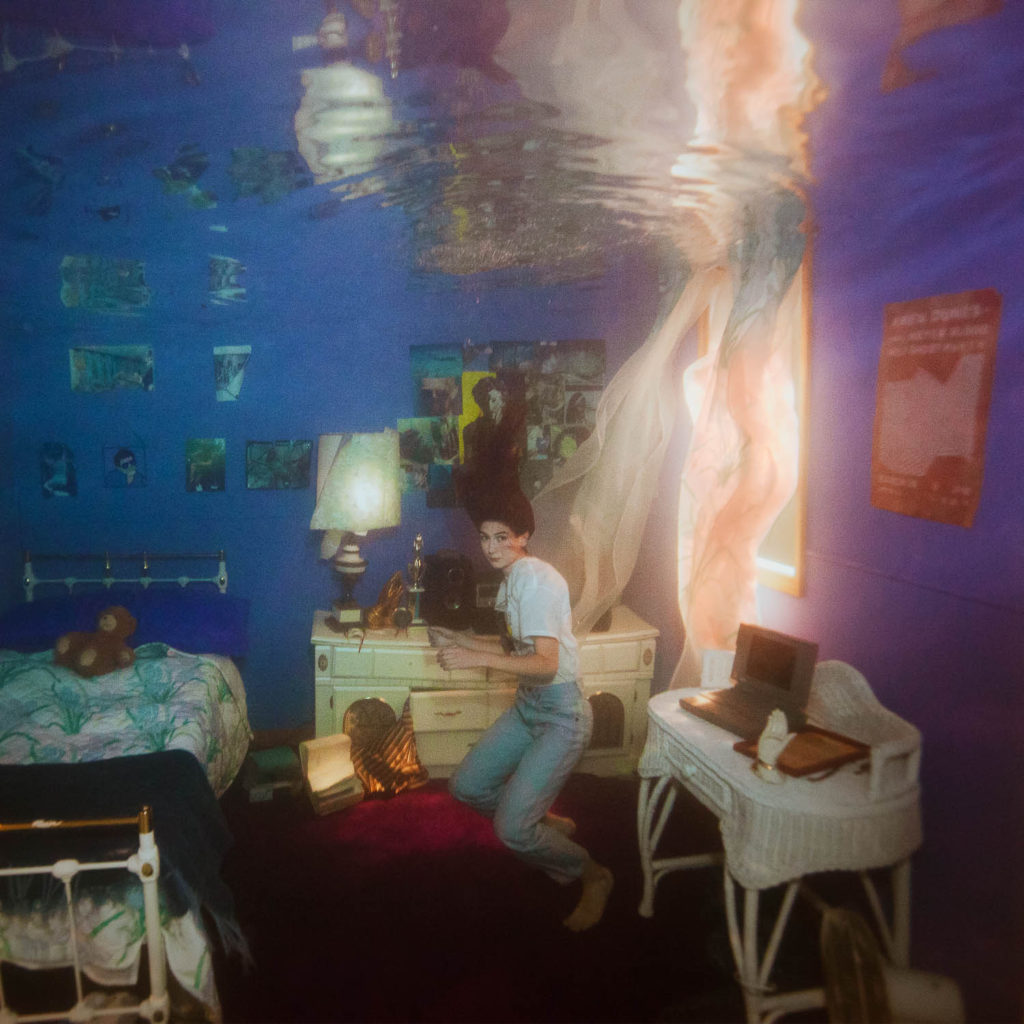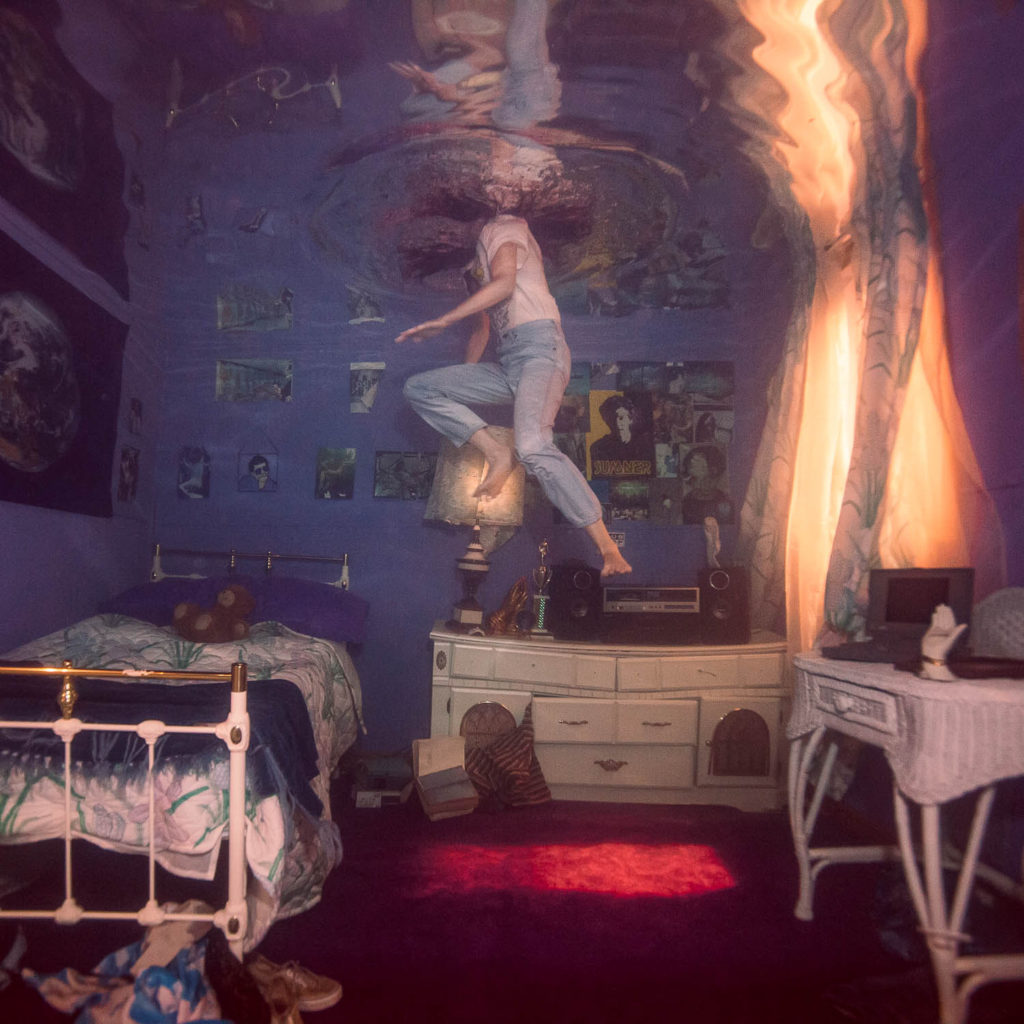
Original article from Stereo Gum
To create the visual aesthetic for Titanic Rising, Natalie Mering of Weyes Blood enlisted Brett Stanley to help bring the underwater cover art to life in a Long Beach, California pool. To ensure the set wouldn’t disintegrate, they relied on shotbags and a two-hour time limit for filming. When I recently spoke with Mering in Brooklyn, we discussed the experience of working with Stanley, the significance of cinema in Titanic Rising, and the process of shooting underwater photographs.
STEREOGUM: How does the cover of Titanic Rising interpret the title?
WEYES BLOOD: Well, it’s kind of like the waters have risen over this bedroom which to me is symbolic of kind of a subconscious altar that all young people in western culture create for themselves. This kind of altar for whatever they worship in their sacred space that’s just theirs. I don’t know. The bedroom is an archetype. To me it stands for a lot of the silliness of our modern culture where the kind of things that we worship in our sacred spaces are based on media and movies because we don’t really have much else in the way of myths, if that makes sense.
STEREOGUM: I think of the bedroom as my safe space. Do you see it differently?
WEYES BLOOD: It’s all of that. I’m just saying that the bedroom, to me, is very symbolic about a sacred inner space. I think all human beings have a propensity to believe in things, and to have hope, and I think as a child especially you have a lot of hope and you believe in a lot of things, and your bedroom is a safe space and an imaginative space where you can escape and go off into wherever you want. For me, it was a very fruitful, special place. It’s kind of where I developed everything about my cosmology and what I believed in, and what I was gonna do with my life. But it’s such an interesting coming of age. You incubate in this weird teenage zone, and then you’re considered an adult. It’s not much of an initiation. It’s kind of just a weird, illusory kind of youth. I think that’s kind of what I wanted to show on the cover.
STEREOGUM: Is the water that you’re submerged in supposed to be a threatening force?
WEYES BLOOD: Well, no, I’m not drowning in it. I’m alive. I think it’s supposed to be symbolic of the subconscious. If the water represented the subconscious, that bedroom lives in that subconscious space. I don’t have the best way of explaining it. A lot of the way that I create is so wrapped up in symbolism that it’s almost better when people just interpret it themselves, because they come up with things that are even more poignant than what I was thinking about. I do try to use surrealist elements to express these ideas. Seeing your bedroom as a sacred altar is pretty surreal because most of the time it’s not seen as such, but I think so many people formulate their ideas about reality in that space. It’s all supposed to represent modern individualism.

CREDIT: Jason Foster
STEREOGUM: There are a variety of posters on the back of the wall. Do they mean anything to you, or were they randomly selected?
WEYES BLOOD: Yeah. There’s a poster of my dad. There’s a Lou Reed stained glass panel. It’s actually mine. It’s in my house. But, the posters were all totally intentional stuff that I printed out.
STEREOGUM: Does it look like your bedroom from childhood?
WEYES BLOOD: No, I’ve never had a bedroom that looked like that, but that’s what I’m saying. It’s more than that. It’s the bedroom that I never had.
STEREOGUM: How were the images for the album cover shot?
WEYES BLOOD: I wanted to do an underwater cover, and I wanted to be sitting on a couch or something. My friend Ariana Popedum-Metropolis — who’s a really brilliant painter — was like, “You know what? We should do it in a bedroom.” Then, she really got me going on that idea. She definitely coined the bedroom thing, and then I kind of went off with that.
I went and got all the stuff, and the photographer [Brett Stanley] was experienced with water, so he could build the set. Water is so heavy and everything is twice as hard, so we all kind of just pitched in and built that room, and then submerged and sunk it. It only had two hours to live before the particle board would get full of water and all messed up, so we shot pretty fast. That’s the whole story.

CREDIT: Jason Foster
STEREOGUM: Were you scared while you were down there holding your breath for long periods of time?
WEYES BLOOD: If the water’s not warm, it’s really scary, [and] you can’t hold your breath as long, so the feeling of impending doom or impending death is that much stronger. It’s kind of like you have to just relax yourself to get under there, and stop wanting to breathe. Then, once you relax and start spacing out, you actually can stay under there for a long time. It’s all about anxiety. When it’s warm, it’s easier to just kind of mellow out and stay down there. When it’s cold, you’re constantly reminded that you could die.
STEREOGUM: Did you have any idea of how you wanted you to look in the photo before you went underwater, or did you just play with different poses?
WEYES BLOOD: I just played with a bunch of different poses.
STEREOGUM: In terms of art, books, music, and film, is there anything that particularly influenced the aesthetic?
WEYES BLOOD: I definitely went and looked at old bedrooms from the ’90s. There’re a lot of articles like that. You can just look at people’s childhood bedrooms. That was how I formulated more of the symbolism that I was talking about where I was like, “Well, the bedroom represents so much more than we even realize.” It’s such a better reflection of what’s going on with our youth than anything else. It was very eye opening to start to do that research and look into these bedrooms, seeing all the similarities. Even the shapes of how people make collages on their walls is really interesting to me. The Magnetic Fields use the bedroom stage set up. That was influential.
STEREOGUM: In terms of the album art, you posted a “who wore it best” type of post with your album art next to Hozier’s album art. Was that just something in good fun?
WEYES BLOOD: Yeah, yeah. I was shocked when I saw his stuff. Exactly the same thing as my stuff. It’s fishy. It’s fishy is what it is. [Laughs]
STEREOGUM: What were the biggest challenges of the underwater shoot?
WEYES BLOOD: The greatest challenge was getting everything to stay underwater and picking out furniture. I was set designing and running around Los Angeles looking for things, wanting something to not feel like I just went to a thrift store. It’s emotional going underwater because it’s such a big deal, and you spend so much time trying to get it right. It can be pretty disappointing if it doesn’t look real. It’s like you’re doing a performance because stuff doesn’t last underwater very long, and it’s also dangerous, but I love it. I’ve been a water baby since I was a child, and it’s always been a big dream of mine. It was inevitable that I would be under the water.
STEREOGUM: How does the cover art correspond to the music video for your single “Movies,” in which a group of people are watching you underwater on film?
WEYES BLOOD: Well, I wanted to still play with the symbolism of the water as being kind of like the subconscious realm. On the cover, we’re in the subconscious realm of your inner bedroom with the posters on the wall. [In “Movies”], the subconscious realm is the film, which is supposed to represent all movies and all the media and content that we just process into our minds more so than any other human beings had ever before. I wanted it to have all the symbolism of movies without being literal, without it being like a movie. I felt like having a starlet underwater looking at herself in the mirror could be a more Lynchian way of expressing the sentiment of “Movies” — which is kind of how I experience movies, as these dark, psychological manipulations or something. My relationship to them is maybe a little more intense than most people.
STEREOGUM: How so?
WEYES BLOOD: I just think as a child, I was really emotionally affected by them. A lot of my family members were performers, and my cousins are comedians and actresses. From a very young age, movies were really important. They were given a lot of value. It’s almost as if it was such a big part of my life at such an impressionable age that I hit a point in puberty where I was like, “Fuck movies.” I stopped watching movies for three years because I was just mad at them for just being so inadequate and being so full of shit.
STEREOGUM: The album title references the Titanic. How did the film play a role in your childhood?
WEYES BLOOD: It was a really big deal. It came out and I saw it a million times. I was already obsessed with the tragedy. Titanic had a big impression on me almost politically, too. I feel like at the expense of the third class, we’d been kind of fucking with people, and industrialization hasn’t really conquered nature in any real way. Nature is about to conquer our ass, and industrialization is not gonna be able to keep up with that. I think, for me, that was a big message in the film, and it always shocked me that nobody else got that message. It just kind of disappeared into the ether. James Cameron just hid away and made Avatar. It’s just such a weird way to see a phenomenon like that play out because it was such a popular movie. It just kind of showed you that no matter how popular a movie could be, no matter how big a star can be and how big of an environmentalist they are, it doesn’t really make a difference. It’s like movies don’t really serve that greater purpose.
STEREOGUM: I have to ask, does the title of your record pay homage to the Amazon series Homecoming? There was a whole episode dedicated to a fake Titanic sequel called Titanic Rising.
WEYES BLOOD: No. I never watched Homecoming. That was completely unintentional. We probably thought of it at the same time.
STEREOGUM: In terms of the music, this record seems like a 3D version of your last album, Front Row Seat To Earth. How did you build on that when it comes to the chord changes and the layering?
WEYES BLOOD: I think that Front Row Seat To Earth was recorded in a garage, and in some ways it has that kind of feel, like it’s very stripped down and very much like band practice. I think on Titanic Rising, it’s more a big performance where I got to work with strings and other textures that I haven’t really been able to work with yet. I think anytime anything gets symphonic it just has more frequencies and it feels a lot bigger.
STEREOGUM: What is this album overall saying about love, and how does it contextualize it?
WEYES BLOOD: I think that it says that true love is making a comeback for only half of us. No, I think it’s just commenting on our restlessness and our ADD behavior, “Nobody loves me,” “Monogamy is dead.” But I think it’s more that people have made commitments to their options, freedom and individualism, which makes relationships different and harder.
STEREOGUM: I feel like there’s a lot of regret in the record as well. “Picture Me Better” was one song that stood out. There’s this push-pull element to it.
WEYES BLOOD: That song is about my friend Sam who committed suicide. Yeah, we all regret that. That’s a huge regret. But yeah, he was a wonderful person. It was really sad, and that song had been kind of written, but he died when I was making the record, and the song just 100 percent made sense to be about him.
STEREOGUM: Each song seems to take you to a different place. How does location factor into your songwriting and production?
WEYES BLOOD: I like writing in total isolation like out in the woods somewhere. I don’t know. I would like that it would take you to that bedroom, just some other subconscious zone. I think that’s the point of music, to transport you into an imaginary place.
STEREOGUM: What do you want the record to tell people?
WEYES BLOOD: I guess the aesthetic and vision is just to wake people up to the pre-conditions of your psychology. If you’ve been spending time wondering what’s wrong with you, maybe that’s what’s wrong with you. Especially in our western culture where we live, we kind of have an existence where we get clean water, warm water. Most people have shelter in America, not everybody, but I think so many people still experience a level of depression. And opiate addictions. Totally just trying to escape the pain of your existence which is on the rise everywhere. I would just hope that in some ways the record is kind of a guide, an understanding of why you feel the way you do, and then how to cultivate a different feeling about the isolation and the solitude, and the myths of our time.

